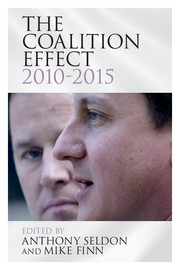Book contents
- Frontmatter
- Contents
- Contributors
- Acknowledgements
- David Cameron as Prime Minister, 2010–2015: The verdict of history
- Part I The coalition and the government of Britain
- Part II The coalition and policy
- Part III The coalition and political culture
- 17 The coalition and the Conservatives
- 18 The coalition and the Liberal Democrats
- 19 The coalition and the Labour Party
- 20 The coalition and the media
- 21 The coalition, elections and referendums
- Part IV Conclusion
- Index
21 - The coalition, elections and referendums
Published online by Cambridge University Press: 05 April 2015
- Frontmatter
- Contents
- Contributors
- Acknowledgements
- David Cameron as Prime Minister, 2010–2015: The verdict of history
- Part I The coalition and the government of Britain
- Part II The coalition and policy
- Part III The coalition and political culture
- 17 The coalition and the Conservatives
- 18 The coalition and the Liberal Democrats
- 19 The coalition and the Labour Party
- 20 The coalition and the media
- 21 The coalition, elections and referendums
- Part IV Conclusion
- Index
Summary
Party stances
The Liberal Democrats have long exhibited a particular interest in constitutional and electoral reform. For many years the party has wanted to get rid of an electoral system for the House of Commons that does it no favours. Ever since the late nineteenth century it has expressed a belief in ‘home rule’ and thus in separately elected devolved institutions. Meanwhile, it was a Liberal government that at the beginning of the twentieth century first limited the power of the Lords and envisaged its ultimate replacement by an elected body.
In contrast, the Conservative Party has often looked like the party of the constitutional status quo. It has consistently been sceptical of the case for electoral reform, has opposed Lords reform and was the last mainstream party to embrace devolution. Elections and referendums in their many potential and varied guises might thus be thought to constitute a potential sticking point in any attempt to fashion a coalition between the two parties. However, the May 2010 election occurred against a backdrop that meant that even a party whose instinct has often been to defend Britain's organic, uncodified constitution was in fact proposing significant change to the electoral process, as well as the more extensive use of referendums.
There were a number of reasons for this development. By no means the least was a crisis of confidence at Westminster. Politicians had already been worrying for a decade or more about apparently falling levels of trust, both in them as a group and in the political system that they ran, an erosion that many felt was reflected in declining levels of turnout at election time. But then in the year before the 2010 election a scandal erupted about the expenses paid to MPs. The Daily Telegraph obtained and published details of the claims made by MPs between 2004 and 2008, details that the Commons authorities had fought hard in the courts to avoid being made public under the provisions of the Freedom of Information Act.
- Type
- Chapter
- Information
- The Coalition Effect, 2010–2015 , pp. 577 - 598Publisher: Cambridge University PressPrint publication year: 2015
- 4
- Cited by



